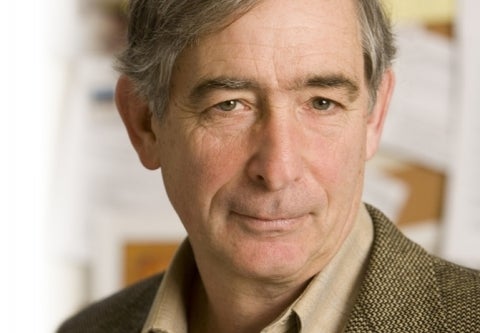Note: Yale School of the Environment (YSE) was formerly known as the Yale School of Forestry & Environmental Studies (F&ES). News articles and events posted prior to July 1, 2020 refer to the School's name at that time.

A national study that was co-led by the late Yale Professor Stephen R. Kellert, found an alarming disconnect between people and nature in the United States — but also widespread opportunities for reconnecting.
In a study of nearly 12,000 American adults and children, the researchers found that more than half of adults report spending five hours or less in nature each week — and most are satisfied with this amount of time. And parents reported that their 8- to 12-year-old children spend three times as many hours with computers and televisions each week as they do playing outside.
In the study, “The Nature of Americans National Report: Disconnection and Recommendations for Reconnection,” a team of researchers offers 22 recommendations built around the premise that a connection to nature is not “a dispensable amenity” but essential for the quality of life, health, social well-being, prosperity and productivity of all Americans.
“Connecting Americans and nature must be a vibrant, ongoing effort supported by all members of the public,” they write. “The state of the natural world and our place within it cannot afford for us to act slowly. We must act now to ensure that present and future generations are connected with nature.”
Despite the challenges, the study suggests that there are opportunities. More than three-quarters of adults rated contact with nature as very or extremely important for their physical health and emotional outlook. And one-quarter of parents said contact with nature improved their child’s weight, attention span, energy, anxiety, asthmas, or other adverse health outcomes.
In addition, seven out of 10 children surveyed said they “would rather explore woods and trees than play on neat-looking grass.” Also, eight out of 10 said they enjoy activities such as climbing trees and camping.
The principal investigators were Kellert, a revered professor of social ecology at the Yale School of Forestry & Environmental Studies, and David J. Case, the founder and president of DJ Case & Associates and practitioner in the field of human dimensions of wildlife and natural resource management.
In a study of nearly 12,000 American adults and children, the researchers found that more than half of adults report spending five hours or less in nature each week — and most are satisfied with this amount of time. And parents reported that their 8- to 12-year-old children spend three times as many hours with computers and televisions each week as they do playing outside.
In the study, “The Nature of Americans National Report: Disconnection and Recommendations for Reconnection,” a team of researchers offers 22 recommendations built around the premise that a connection to nature is not “a dispensable amenity” but essential for the quality of life, health, social well-being, prosperity and productivity of all Americans.
“Connecting Americans and nature must be a vibrant, ongoing effort supported by all members of the public,” they write. “The state of the natural world and our place within it cannot afford for us to act slowly. We must act now to ensure that present and future generations are connected with nature.”
Despite the challenges, the study suggests that there are opportunities. More than three-quarters of adults rated contact with nature as very or extremely important for their physical health and emotional outlook. And one-quarter of parents said contact with nature improved their child’s weight, attention span, energy, anxiety, asthmas, or other adverse health outcomes.
In addition, seven out of 10 children surveyed said they “would rather explore woods and trees than play on neat-looking grass.” Also, eight out of 10 said they enjoy activities such as climbing trees and camping.
The principal investigators were Kellert, a revered professor of social ecology at the Yale School of Forestry & Environmental Studies, and David J. Case, the founder and president of DJ Case & Associates and practitioner in the field of human dimensions of wildlife and natural resource management.
Remembering Stephen Kellert
 <small>Stephen R. Kellert ’71 Ph.D., a revered professor of social ecology at the Yale School of Forestry & Environmental Studies whose research and writing advanced the understanding of the connection between humans and the natural world, died on Nov. 27 after a long illness. <a href="http://environment.yale.edu/news/article/remembering-stephen-kellert-longtime-professor-of-social-ecology/">Read more</a></small>
<small>Stephen R. Kellert ’71 Ph.D., a revered professor of social ecology at the Yale School of Forestry & Environmental Studies whose research and writing advanced the understanding of the connection between humans and the natural world, died on Nov. 27 after a long illness. <a href="http://environment.yale.edu/news/article/remembering-stephen-kellert-longtime-professor-of-social-ecology/">Read more</a></small>
The study was grounded in Kellert’s 1970s-era research of Americans’ perceptions of nature — research that is widely recognized as the wellspring for the study of the social dimensions of conservation. He remained passionate about this project until his death in November, providing guidance and direction on reports just two weeks before his passing.
“Our research team is deeply saddened by his loss,” the researchers write in a tribute to Kellert. “Dr. Kellert was joyous and enthusiastic in his work — as anyone who came in contact with him would agree — and hopeful that the study’s findings would provide important guidance to improving human health and well-being. It is with highest esteem that we continue this initiative as a tribute to his immeasurable contributions as scholar, colleague, and friend.”
This public–private collaborative was sponsored by the Fish & Wildlife Foundation of Florida, the Florida Fish and Wildlife Conservation Commission, the Texas Parks & Wildlife Department, the U.S. Fish & Wildlife Service, the Disney Conservation Fund, the Morrison Family Foundation, the Wildlife Management Institute, and Yale University.
“Our research team is deeply saddened by his loss,” the researchers write in a tribute to Kellert. “Dr. Kellert was joyous and enthusiastic in his work — as anyone who came in contact with him would agree — and hopeful that the study’s findings would provide important guidance to improving human health and well-being. It is with highest esteem that we continue this initiative as a tribute to his immeasurable contributions as scholar, colleague, and friend.”
This public–private collaborative was sponsored by the Fish & Wildlife Foundation of Florida, the Florida Fish and Wildlife Conservation Commission, the Texas Parks & Wildlife Department, the U.S. Fish & Wildlife Service, the Disney Conservation Fund, the Morrison Family Foundation, the Wildlife Management Institute, and Yale University.
Published
April 26, 2017